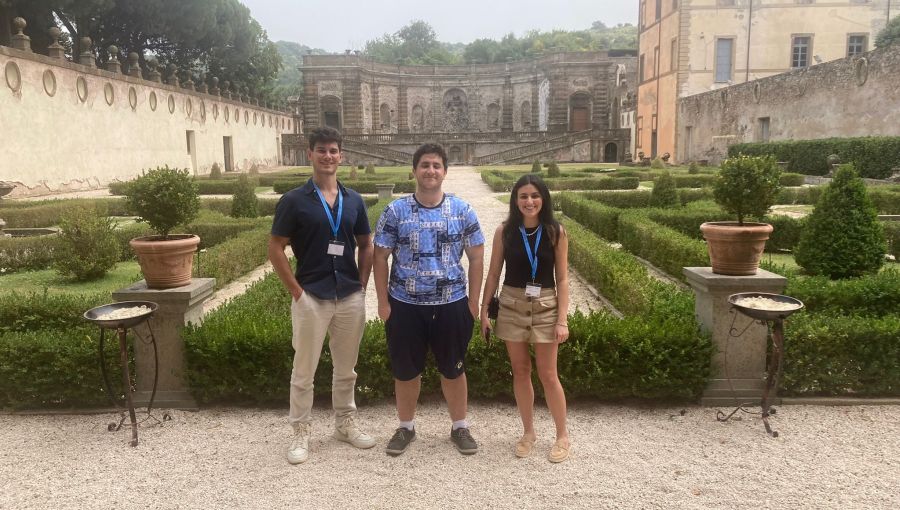Media Literacy in the World: Alumna Wanda Gabai
Wanda Gabai graduated from JCU in 2010 with a degree in Communications. She was born in Naples, Italy, and her passion for traveling and exploring different lifestyles and cultures led her to live in different parts of the world. Gabai worked as an International Consultant for the Research Center of Communication and Development Knowledge Management (CCDKM), in Thailand. During her time at CCDKM, the Center received the UNESCO Wenhui Award for Educational Innovation 2015 and the Gem Tech Awards 2015, Application of Technology for Women’s Empowerment – UN Women and the International Telecommunications Union (ITU).
How did you become interested in digital and media literacy?
Professor Antonio Lopez was my mentor during my years at JCU. He opened my mind on how to critically question and understand the world through the lens of digital and media literacy. During our last semester, my sister and I were the only students to request an independent study on media literacy. At the time, few recognized the value of this subject. Today media literacy is internationally recognized by UNESCO, by the European Commission, and by governments all over the world as a fundamental human right and a priority in education. That course was life changing!
Tell us about your work at the Research Center of Communication and Development Knowledge Management (CCDKM) in Thailand.
For several years, I had the opportunity to work as an International Consultant for the Research Center of Communication and Development Knowledge Management (CCDKM) based at Sukhothai Thammathirat Open University, in Thailand. My role was to support the creation and implementation of projects and initiatives to strengthen rural and disadvantaged people’s capacities in Smart SME (small to medium size enterprises) Business solutions, entrepreneurship and digital literacy, skills needed in the digital economy and society. Our team has trained thousands of Thais on how to promote and sell their products online, create sustainable tourism experiences, reach new markets, and join international supply chains.
What did you like most about your work? Tell us about a challenge that you encountered and how you overcame it.
I loved collaborating directly with the grassroots communities, namely, disadvantaged women and girls, homeworkers, people with disabilities, farmers, and youths. These communities are the custodians of Thai local wisdom. It was a continuous knowledge exchange. While I was teaching them entrepreneurship skills to boost their local businesses at national and international levels, I had the privilege to learn about Thailand and Thai culture through their direct life experiences. Language barriers were indeed a challenge; however, we overcame them by using smartphone technology, applications and visual representations (almost a universal language!). Learning the work ethic of Thailand and developing strong coordination and collaboration skills with our Thai team members were fundamental to ensure the success of our projects. The communities we have trained have been featured in international magazines and media outlets and have been hosting international visitors in their villages. I am proud of them and their successes, but most importantly, of the self-confidence they gained during and after the training program.
We think of Southeast Asia as an area with many high media literacy countries. Is this the case for Thailand too?
Media literacy is increasingly being recognized worldwide as a set of key competencies needed to face and overcome many of the challenges of the 21st century media saturated world. Internet connectivity and digital media usage in Southeast Asia is growing at an impressive rate. In 2017, Thailand remains in the top 10 countries worldwide with the highest social media usage (47 million users), and Bangkok also remains the world’s biggest city for Facebook users (27 million). While many often discard the challenges rising with the advent of new media, the government of Thailand, the telecom sector, the public broadcaster, universities, and numerous civil society organizations are all working together to promote media literacy programs and initiatives throughout the country.
Recently, you were invited to speak at a conference in Aieta, Calabria on the repopulation of Italian towns. Tell us about your presentation.
The presentation was an introduction to the work I have been doing with Very Local Trip, one of the top ten start-up companies for Community Based Tourism (CBT) in Asia. The conference was a first step to introduce to different partners and stakeholders the skills and competencies to improve the quality of their tourism experiences at the local level, revitalize the local economy, alleviate poverty, preserve culture and traditions, and create employment opportunities for their local communities.
Is there any class at JCU that helped you in your career? Any advice for a new student starting college?
All the media and communication classes, including Public Speaking, the hands-on experience courses on Social Marketing and Development in Ghana with Prof. Alessandro Signorini, and Digital Photography with Prof. Paolo Soriani, were definitely crucial for my career. My advice to new students is to make the most out of their academic experience at JCU and never underestimate the importance of building relationships with their professors. Today, you will start as a JCU student; tomorrow you might find amazing business partners and colleagues that once were your professors. Fast learning, problem solving, a strong and flexible personality, enthusiasm, and an intercultural mindset are the key ingredients to succeed in diverse fields.







